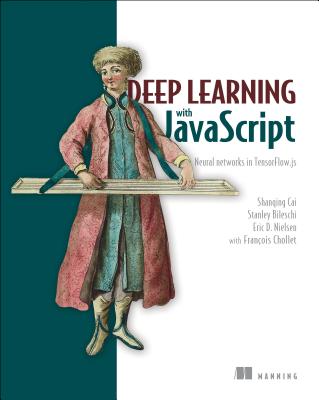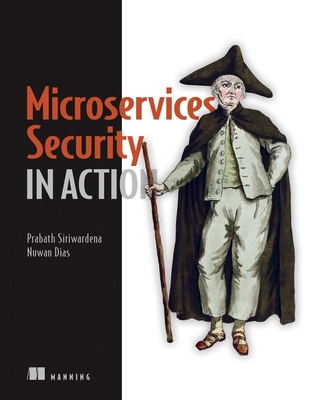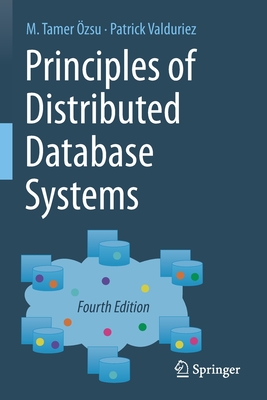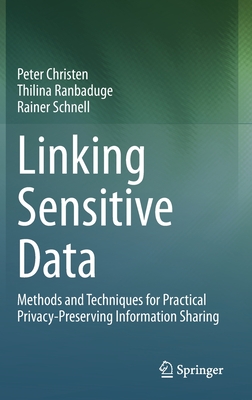買這商品的人也買了...
-
 Arduino 官方正版 Genuino 101
Arduino 官方正版 Genuino 101$1,700$1,700 -
 Raspberry Pi 3 Model B+ (UK製)
Raspberry Pi 3 Model B+ (UK製)$4,620$4,389 -
 JVM Performance Engineering: Inside OpenJDK and the HotSpot Java Virtual Machine (Paperback)
JVM Performance Engineering: Inside OpenJDK and the HotSpot Java Virtual Machine (Paperback)$1,980$1,881 -
 晉昇軟體最高殿堂:Jenkins2 持續整合大師之路
晉昇軟體最高殿堂:Jenkins2 持續整合大師之路$600$474 -
 $1,320Deep Learning with JavaScript: Neural Networks in Tensorflow.Js
$1,320Deep Learning with JavaScript: Neural Networks in Tensorflow.Js -
 JavaScript 技術手冊
JavaScript 技術手冊$560$476 -
 Building a Future-Proof Cloud Infrastructure: A Unified Architecture for Network, Security and Storage Services (Paperback)
Building a Future-Proof Cloud Infrastructure: A Unified Architecture for Network, Security and Storage Services (Paperback)$1,998$1,898 -
 $1,584Microservices Security in Action
$1,584Microservices Security in Action -
 Principles of Distributed Database Systems, 4/e (Paperback)
Principles of Distributed Database Systems, 4/e (Paperback)$2,790$2,651 -
 $2,160Parallel and High Performance Computing (Paperback)
$2,160Parallel and High Performance Computing (Paperback) -
 $2,070Multithreaded JavaScript: Concurrency Beyond the Event Loop
$2,070Multithreaded JavaScript: Concurrency Beyond the Event Loop -
 Structure and Interpretation of Computer Programs: JavaScript Edition (Paperback)
Structure and Interpretation of Computer Programs: JavaScript Edition (Paperback)$2,680$2,546 -
 Understanding Distributed Systems : What every developer should know about large distributed applications, 2/e (Paperback)
Understanding Distributed Systems : What every developer should know about large distributed applications, 2/e (Paperback)$1,650$1,568 -
 建構機器學習管道|運用 TensorFlow 實現模型生命週期自動化 (Building Machine Learning Pipelines: Automating Model Life Cycles with Tensorflow)
建構機器學習管道|運用 TensorFlow 實現模型生命週期自動化 (Building Machine Learning Pipelines: Automating Model Life Cycles with Tensorflow)$580$458 -
 $2,052Mastering API Architecture: Design, Operate, and Evolve Api-Based Systems (Paperback)
$2,052Mastering API Architecture: Design, Operate, and Evolve Api-Based Systems (Paperback) -
 $2,233Functional and Concurrent Programming: Core Concepts and Features
$2,233Functional and Concurrent Programming: Core Concepts and Features -
 $1,767Functional Design: Principles, Patterns, and Practices (Paperback)
$1,767Functional Design: Principles, Patterns, and Practices (Paperback) -
 OpenTelemetry 入門指南:建立全面可觀測性架構(iThome鐵人賽系列書)【軟精裝】
OpenTelemetry 入門指南:建立全面可觀測性架構(iThome鐵人賽系列書)【軟精裝】$750$585 -
 Learning Systems Thinking: Essential Nonlinear Skills and Practices for Software Professionals (Paperback)
Learning Systems Thinking: Essential Nonlinear Skills and Practices for Software Professionals (Paperback)$2,100$1,995 -
 Collaborative Software Design: How to Facilitate Domain Modeling Decisions
Collaborative Software Design: How to Facilitate Domain Modeling Decisions$1,750$1,663 -
 內行人才知道的機器學習系統設計面試指南 (Machine Learning System Design Interview)
內行人才知道的機器學習系統設計面試指南 (Machine Learning System Design Interview)$680$537 -
 $1,995Mastering Opentelemetry and Observability: Enhancing Application and Infrastructure Performance and Avoiding Outages
$1,995Mastering Opentelemetry and Observability: Enhancing Application and Infrastructure Performance and Avoiding Outages -
 Full Stack JavaScript Strategies: The Hidden Parts Every Mid-Level Developer Needs to Know (Paperback)
Full Stack JavaScript Strategies: The Hidden Parts Every Mid-Level Developer Needs to Know (Paperback)$2,170$2,062 -
 $2,205Beyond Vibe Coding: From Coder to Ai-Era Developer (Paperback)
$2,205Beyond Vibe Coding: From Coder to Ai-Era Developer (Paperback) -
 Building Event-Driven Microservices: Leveraging Organizational Data at Scale
Building Event-Driven Microservices: Leveraging Organizational Data at Scale$2,450$2,328
相關主題
商品描述
Like other sciences and engineering disciplines, software engineering requires a cycle of model building, experimentation, and learning. Experiments are valuable tools for all software engineers who are involved in evaluating and choosing between different methods, techniques, languages and tools.
The purpose of Experimentation in Software Engineering is to introduce students, teachers, researchers, and practitioners to empirical studies in software engineering, using controlled experiments. The introduction to experimentation is provided through a process perspective, and the focus is on the steps that we have to go through to perform an experiment. The book is divided into three parts. The first part provides a background of theories and methods used in experimentation. Part II then devotes one chapter to each of the five experiment steps: scoping, planning, execution, analysis, and result presentation. Part III completes the presentation with two examples. Assignments and statistical material are provided in appendixes. Overall the book provides indispensable information regarding empirical studies in particular for experiments, but also for case studies, systematic literature reviews, and surveys. It is a revision of the authors’ book, which was published in 2000. In addition, substantial new material, e.g. concerning systematic literature reviews and case study research, is introduced.
The book is self-contained and it is suitable as a course book in undergraduate or graduate studies where the need for empirical studies in software engineering is stressed. Exercises and assignments are included to combine the more theoretical material with practical aspects. Researchers will also benefit from the book, learning more about how to conduct empirical studies, and likewise practitioners may use it as a “cookbook” when evaluating new methods or techniques before implementing them in their organization.
商品描述(中文翻譯)
像其他科學和工程學科一樣,軟體工程需要一個模型建立、實驗和學習的循環。實驗是所有參與評估和選擇不同方法、技術、語言和工具的軟體工程師的重要工具。
《軟體工程中的實驗》旨在向學生、教師、研究人員和實務工作者介紹使用控制實驗進行的軟體工程實證研究。實驗的介紹是通過過程的角度來提供,重點在於我們必須經歷的步驟以執行實驗。這本書分為三個部分。第一部分提供了實驗中使用的理論和方法的背景。第二部分則為五個實驗步驟中的每一個步驟:範圍界定、規劃、執行、分析和結果呈現,分別專門設置了一章。第三部分則用兩個範例來完成介紹。附錄中提供了作業和統計資料。整體而言,這本書提供了關於實證研究的重要資訊,特別是針對實驗,但也適用於案例研究、系統文獻回顧和調查。這是作者於2000年出版的書籍的修訂版。此外,還引入了大量的新材料,例如有關系統文獻回顧和案例研究的內容。
這本書是自成一體的,適合作為本科或研究生課程的教材,強調在軟體工程中進行實證研究的必要性。書中包含練習和作業,以將更理論的材料與實際方面結合起來。研究人員也將從這本書中受益,學習如何進行實證研究,同樣,實務工作者在評估新方法或技術之前,也可以將其用作“食譜”。












